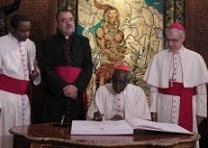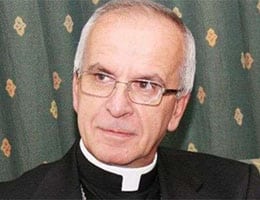 An individual whose function is to carry an order or a statement is called a nuncio . The nuncio is sent by a person to contact another person and leave the notice in question.
An individual whose function is to carry an order or a statement is called a nuncio . The nuncio is sent by a person to contact another person and leave the notice in question.
The diplomat who represents the pope and who has certain pontifical powers is also known as a nuncio. In this case we usually speak specifically of an apostolic nuncio .
This nuncio serves as ambassador of the Holy See (the pope's jurisdiction). In this way he assumes the representation of the leader of the Catholic Church . This is usually an archbishop: Pope John XXIII , for example , was a nuncio before becoming supreme pontiff.
The current apostolic nuncio in Argentina , to mention one case , is the Congolese León Kalenga Badikebele , who had been nuncio in Ghana , El Salvador and Belize . The appointment of Monsignor Badikebele was made by Pope Francis in March 2018 .
In 2003 , a nuncio was killed by criminals while carrying out his mission: the Irish monsignor Michael Courtney , the pope's representative in Burundi . This apostolic nuncio was trying to contribute to the peace process in that area of Africa when he was shot dead. Courtney had arrived in Burundi in 2000 and that same year she had already suffered an attack.
In this context there is the concept of apostolic nunciature , a diplomatic mission of the Holy See whose rank is very high and which participates in the diplomatic relations it has with the outside world. Its name makes it clear that it is headed by a nuncio, who can also be mentioned as a papal ambassador . In other words, we can say that it acts as an embassy to the rest of the world.
It is important not to confuse the role of the nuncio with that of the apostolic delegate , since the latter does not carry out official diplomatic functions. In other words, they are not part of the diplomatic corps and, therefore, they do not officially represent the Pope vis-à-vis other States.
Generally, the Holy See sends an apostolic delegate to those parts of the world with which it has not established any diplomatic relations. For this reason, the headquarters in which it is established does not have diplomatic immunity nor does it enjoy any of the privileges generally associated with ambassadors. This does not mean that apostolic delegates do not receive any protection from their superiors: before being sent abroad, the State that will receive them must guarantee a series of conditions related to their personal safety and the freedom to live their religion.
 From the role of the nuncio to that of the apostolic delegate, through its diplomatic relations , the Holy See claims to ceaselessly seek paths of justice for human beings, a reality in which obligations are fulfilled and the rights of all people are respected. people, wherever they live.
From the role of the nuncio to that of the apostolic delegate, through its diplomatic relations , the Holy See claims to ceaselessly seek paths of justice for human beings, a reality in which obligations are fulfilled and the rights of all people are respected. people, wherever they live.
The Vatican believes in the common good as an undeniable source of individual good. For this reason, the pope carries out diplomatic work mainly helped by the nuncio to communicate effectively with the rest of the world and spread this message of equality.
Outside the scope of the Church, it was thanks to the work of Popes Paul VI and John Paul II that the figure of the nuncio is more widely known. Despite this, many associate it with politics or technocracy; However, his role is similar to that of a pastor with academic and priestly training.
According to the dictionary of the Royal Spanish Academy ( RAE ), the idea of nuncio can also be used to refer to a sign or a warning . For example: “The agitation of birds is a warning of a storm,” “Statements of this type are usually a warning of an internal crisis.”
